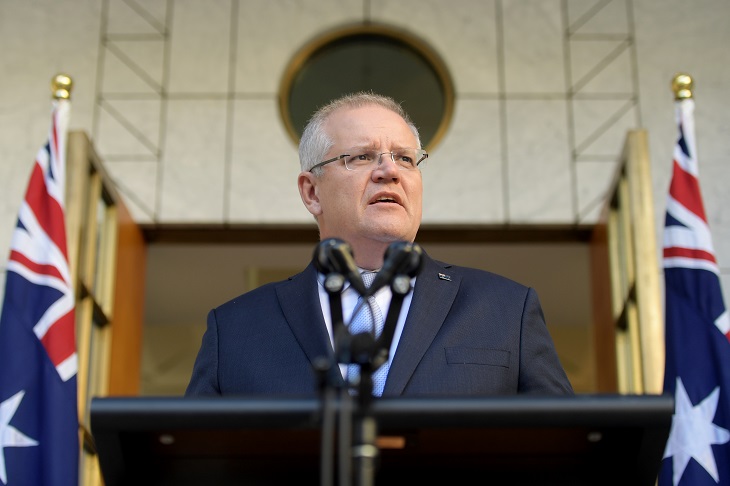Calls by ‘big end of towners’ for industrial relations reforms amount to little more than kicking election campaign goals for the union movement and Labor. Just one example is Anthony Albanese recently praising a deal between the Business Council of Australia and the ACTU for IR reform.
The Morrison government has fiddled with some proposed IR reforms in response to complaints from big business lobbyists about the difficulties of the ‘good faith bargaining’ process. But the big election campaign trap for any Coalition government is that any talk of IR reform raises public suspicion of a repeat of the 2007 Howard-era WorkChoices disaster. Morrison’s recent announcements on this issue are a step in a dangerous direction for him.
Certainly, Labor’s election team would surely salivate at the prospect of a re-run of a WorkChoices-style campaign. Remember, the trick to the unions’ highly successful 2007 campaign against Howard/WorkChoices was one of ‘imagination’. That is, even if individual voters were not personally ‘exploited’ under WorkChoices laws, the union/Labor campaign played on the idea that voters could ‘imagine’ someone who was exploited.
For Morrison the current workplace laws are a political gift from Labor, but only if Morrison chooses to treat those laws as such. The 2009 Fair Work Act was designed and implemented by Labor’s then Workplace Relations Minister Julia Gillard. Any failings it has are Labor’s failings, not Morrison’s.
The complaint by the big business lobby groups is that, under the Fair Work Act, Enterprise Agreements (EAs) are dying a slow death. The number of private workers covered by EAs dropped to 1.7 million in 2021, down from 2.6 million in 2010. The lobby groups say that the processes required under ‘good faith bargaining’ makes enterprise negotiations too difficult. They complain that they can’t achieve more productive workplace arrangements. They want Morrison to fix this. Therein lies the political trap.
But here’s the managerial, economic, and productivity truth. The failings of any large business to achieve productivity improvements under the Fair Work Act are a direct reflection of its managerial incompetence. The Fair Work Act does not need to be changed. The Morrison government would be inviting potential electoral suicide if it fell into a political trap, even if unintended, as a result of big business managerial pleadings.
The facts are that under Labor’s Fair Work Act, no business is required or forced to enter an enterprise agreement or even to enter into negotiations for one. Plus, nothing in the Fair Work Act restricts pay arrangements with respect to the minimums required under awards or enterprise agreements. Businesses can pay workers above the award/EA requirements. They cannot pay below them.
What’s been happening is that large numbers of businesses have realised that they can allow EAs to expire and be cancelled, revert to award minimums, and then pay workers above-award rates based on current labour market rates. Such businesses can and are effectively restructuring progressively over time given their specific labour needs. And in an environment of 4 per cent unemployment, such responsive flexibility to higher pay rate market forces gives those businesses a competitive advantage over EA-strangulated businesses.
So, why don’t more large businesses realise this? Well, that’s to do with the entrenched ‘business’ models of industrial relations lawyers, consultants, and other IR system hangers-on. These ‘professional’ groups run the IR departments and systems of many large companies and public service departments. Their careers are dependent on keeping the enterprise bargaining system running. This effectively restricts or even neuters the ability of line managers to manage.
What frustrates these ‘professionals’ is that, under the Fair Work Act, once a business declares an interest in having or renewing an enterprise agreement, it is then required to ‘bargain in good faith’. Under the Act, the requirements for the bargaining are horribly complex, legalistic, full of procedural landmines, and inevitably give unions huge control over the processes and outcomes. This makes the enterprise agreement system massively uncompetitive in a dynamic and changing economy.
What these professionals want – and the push from their big business lobbyist organisations reflects this – are changes to the ‘good faith bargaining’ aspects of the Act. But that’s a nightmare for any Coalition government to contemplate or attempt. Besides, it would only be seeking to save the necks of businesses that can’t manage their way out of problems of their own making.
At present, the outcome is that the non-enterprise-agreement method of managing is out-competing the enterprise agreement management method across the economy. In effect, Julia Gillard’s Fair Work Act opened the door for market forces to enter the industrial relations system. In some respects it’s really been WorkChoices without ‘WorkChoices’!
I’ll exclude the commercial construction sector from this analysis. That sector has an entirely different industrial relations dynamic that hinges around a mafia-style approach to control of the sector and limitation of competition. But that’s a story for another day!
In the broader private-sector economy, however, enterprise agreements are proving poison for business efficiency, higher wages, and better productivity. Coalition governments under Prime Ministers Tony Abbott, Malcolm Turnbull, and (to date) Scott Morrison have sat tight and not changed the Fair Work Act. There’s far too much political downside and dubious political upside in making changes.
That Morrison is an astute politician is undoubted. On this issue, the most astute thing to do is to listen politely to the ‘big end of town’ lobbyists and do nothing.
Ken Phillips is Executive Director of Self Employed Australia
Got something to add? Join the discussion and comment below.
Get 10 issues for just $10
Subscribe to The Spectator Australia today for the next 10 magazine issues, plus full online access, for just $10.


























Comments
Don't miss out
Join the conversation with other Spectator Australia readers. Subscribe to leave a comment.
SUBSCRIBEAlready a subscriber? Log in